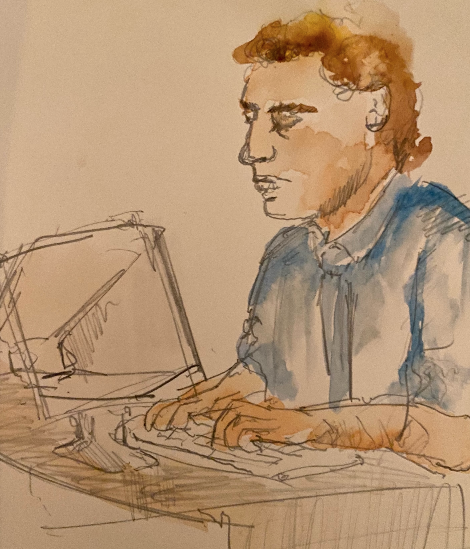- Return to sender - 20th February 2026
- Legal eagle - 19th February 2026
- Round Robin - 19th February 2026

During 38 years in journalism, and 23 years at the BBC, our Editor Phil Parry, was always forced to deal with Press Officers (PO), but now looks with consternation at the failure of a major department store to provide a statement over why they used a picture of the shamed actor Johnny Depp, even though a court found him to be a wife-beater. He also examines how, after more than a week, the BBC have still not given him reasons for their ‘conflict of interest’ policy, squaring with a former Welsh rugby international being shown talking about his hospitality business, and officials at the corporation transmitting a package where the man was filmed ‘interviewing’ people in a hospitality tent.
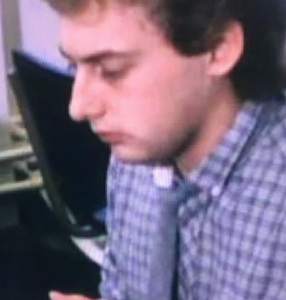
Earlier he has described how he was helped to break into the South Wales Echo office car when he was a cub reporter, recalled his early career as a journalist, the importance of experience in the job, and making clear that the ‘calls’ to emergency services as well as court cases are central to any media operation.
He has also explored how poorly paid most journalism is when trainee reporters had to live in squalid flats, the vital role of expenses, and about one of his most important stories on the now-scrapped 53 year-old BBC Cymru Wales TV Current Affairs series he presented for 10 years, Week In Week Out (WIWO), which won an award even after it was axed, long after his career really took off.

Phil has explained too how crucial it is actually to speak to people, the virtue of speed as well as accuracy, why knowledge of ‘history’ is vital, how certain material was removed from TV Current Affairs programmes when secret cameras had to be used, and some of those he has interviewed.
He has also disclosed why investigative journalism is needed now more than ever although others have different opinions, and how information from trusted sources is crucial at this time.

One of the great advantages of now being an investigative journalist, is that I almost NEVER have to deal with Press Officers (POs).
They only provide the official line of that particular organisation, showing it in a good light (things like the ‘wonderful research that is being undertaken’, or ‘what students are doing now’, if it is a university), and they will invariably present difficulties as being ‘in the past’, occurring under ‘another regime’, or that ‘the guidelines have since been tightened up’.
These people never give details of crookedness within their institution, or the hypocrisy of senior officials.
You only get REAL information like this (sometimes anonymously), from those who do the hard graft there! However when I started in journalism, as a trainee reporter on the South Wales Echo (SWE) (then the biggest-selling newspaper in Wales), it was VERY different.


I HAD to talk to POs regularly, to get their line about an incident which had happened – whether it be about an official who was caught with his or her hand in the till, or details of an accident.
In those days you would ring up the PO for a response which was given almost immediately (certainly within hours of the request being made), although now it is invariably done by email, and you would be asked idiotic questions like: “What’s you deadline?” (even though, as any self-respecting journalist will know, the answer is always: “ASAP”), or “What do you need it for?” (that one always infuriates me, because I just want FACTS, so it is up to ME ‘what I need a statement for’!).

In fact when I began in 1983, a joke did the rounds in my newsroom: “Q: What do you do after being a journalist? A: Go into Public Relations, or become a Press Officer!”.
But during all those years I have NEVER come across a situation where the media team have given me NOTHING whatsoever.

I usually received some sort of nonsense, such as: “We are continuing to make positive contributions to society”, or, “This incident does not represent us in our entirety”.
Yet on TWO occasions now I have received only total silence.
One of them concerns a giant department store with a shop in Cardiff, which has failed to give me anything since November about using to sell male perfume, the picture of an actor labelled in court a ‘wife beater’, even though, when asked, I said they should give details “As soon as possible”. The other is from officials at the BBC, about their conflict of interest policy, after the ex Wales and Lions rugby international, Tom Shanklin, was allowed to mention his commercial hospitality business during a television discussion about Friday night fixtures, and he was shown presenting an insert ‘package’ on the same programme using a BBC microphone in a hospitality tent.
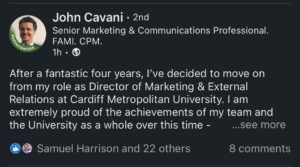 These bizarre actions (or non-actions) follow other strange events. One is how John Cavani a “Senior Marketing & Communications Professional”, who is leaving (or has left), Cardiff Metropolitan University (CMU), saying in a social media message that he had “decided to move on”, attempting, several years ago, to use his skills on me, along with a senior Public Relations (PR) worker, by trying to persuade me to report ‘positive’ stories about his university.
These bizarre actions (or non-actions) follow other strange events. One is how John Cavani a “Senior Marketing & Communications Professional”, who is leaving (or has left), Cardiff Metropolitan University (CMU), saying in a social media message that he had “decided to move on”, attempting, several years ago, to use his skills on me, along with a senior Public Relations (PR) worker, by trying to persuade me to report ‘positive’ stories about his university.
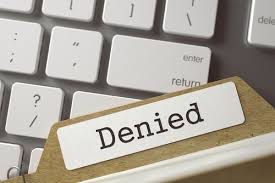 Mr Cavani also didn’t respond to a gmail marked “urgent” asking for information, even though he claims to be a specialist in communications.
Mr Cavani also didn’t respond to a gmail marked “urgent” asking for information, even though he claims to be a specialist in communications.
Let’s look at the John Lewis (JL) case first.
Mr Justice Nicol ruled that the actor whose picture they used to promote Dior’s Eau Sauvage (Johnny Depp) had attacked his then wife Amber Heard 12 TIMES during their relationship, and that The Sun article about the assaults, was “substantially true”.
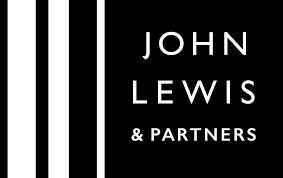
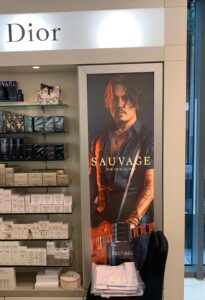 Despite this, JL displayed a huge picture of Mr Depp in the perfume department of its Cardiff shop. In November I requested of the JL PO an explanation about their policy, and was told the issue would be ‘looked into‘. In the return message from JL the same day, I was also asked to provide a deadline.
Despite this, JL displayed a huge picture of Mr Depp in the perfume department of its Cardiff shop. In November I requested of the JL PO an explanation about their policy, and was told the issue would be ‘looked into‘. In the return message from JL the same day, I was also asked to provide a deadline.
Yet that was the ONLY response I have received!
They told me: “Hello Phil, Thank you for your email and getting in touch. We will look into this for you – please could you let me know what your deadline is?
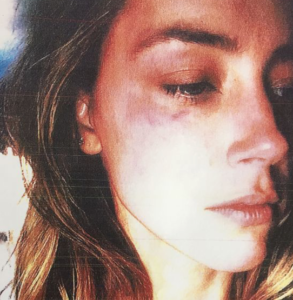
I wanted to ask JL about the libel case against Mr Depp, and why they were using his picture to sell Eau de Cologne, but I couldn’t.
The judge in the case where Mr Depp sat at its heart, ruled that he had beaten Amber Heard, 12 out of 14 times – starting in 2013 when he slapped the actress after she made a comment about his tattoo.
He dismissed two allegations made by Ms Heard in 2014 and 2015, although he said he couldn’t conclude that she had been “untruthful”.
But complete silence from the JL Press Office followed, and it is meant, of course, to SERVE journalists! This incredible state of affairs, even became a subject for our satirical writer, Edwin Phillips!
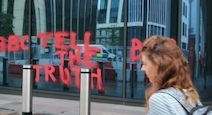 Sadly this behaviour has, it seems, been replicated closer to home, too, in the strange case about the use of Mr Shanklin on BBC Cymru Wales’ (BBC CW) Scrum V.
Sadly this behaviour has, it seems, been replicated closer to home, too, in the strange case about the use of Mr Shanklin on BBC Cymru Wales’ (BBC CW) Scrum V.
THAT situation appeared worthy of questions to the BBC Press Office, which I framed on Monday of last week, as follows: “Hi. My name is Phil Parry and I am Editor of the Welsh-based investigative website The Eye.
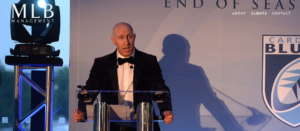
“Please provide a statement in relation to the following: On BBC Wales television last night (Sunday March 13), the ex Wales & Lions rugby international, Tom Shanklin touched on his commercial hospitality interests during a discussion about Friday night fixtures. Then, later in the programme, he anchored a vox pop insert package using a BBC microphone in a hospitality tent.
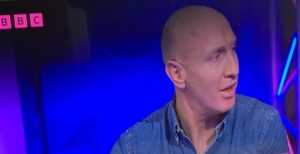
“Did he have any connections to the function? If so, then how does this square with Editorial Guidelines on declaring a conflict of interest?”
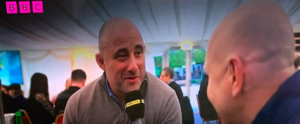
They are after all PRESS OFFICERS!
The memories of Phil’s extraordinary 38 year award-winning career in journalism (when questions about major events were almost always answered by Press Officers) as he was gripped by the rare disabling condition Hereditary Spastic Paraplegia (HSP), have been released in the book ‘A GOOD STORY’. Order the book now! The picture doubles as a cut-and-paste poster!

Regrettably publication of another book, however, was refused, because it was to have included names.








